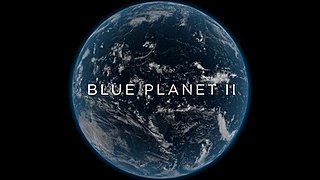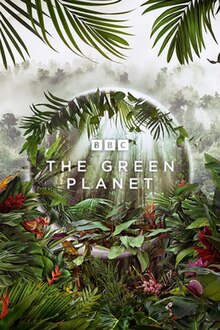
Sir David Frederick Attenborough is a British broadcaster, biologist, natural historian, and writer. He is best known for writing and presenting, in conjunction with the BBC Studios Natural History Unit, the nine nature documentary series forming the Life collection, a comprehensive survey of animal and plant life on Earth.

The Blue Planet is a British nature documentary series created and co-produced as a co-production between the BBC Natural History Unit and Discovery Channel. It premiered on 12 September 2001 in the United Kingdom. It is narrated by David Attenborough.
The BBC Studios Natural History Unit (NHU) is a department of BBC Studios that produces television, radio and online content with a natural history or wildlife theme. It is best known for its highly regarded nature documentaries, including The Blue Planet and Planet Earth, and has a long association with David Attenborough's authored documentaries, starting with 1979's Life on Earth.

A nature documentary or wildlife documentary is a genre of documentary film or series about animals, plants, or other non-human living creatures. Nature documentaries usually concentrate on video taken in the subject's natural habitat, but often including footage of trained and captive animals, too. Sometimes they are about wildlife or ecosystems in relationship to human beings. Such programmes are most frequently made for television, particularly for public broadcasting channels, but some are also made for the cinema. The proliferation of this genre occurred almost simultaneously alongside the production of similar television series which is distributed across the world.

Planet Earth is a 2006 nature documentary television miniseries produced as a co-production between the BBC Natural History Unit, BBC Worldwide, Discovery Channel and NHK, in association with CBC. Five years in the making, Planet Earth was the most expensive nature documentary series ever commissioned by the BBC and also the first to be filmed in high definition. The series received multiple awards, including four Emmy Awards, a Peabody Award, and an award from the Royal Television Society.

Frozen Planet is a 2011 British nature documentary series. It was produced as a co-production between the BBC Natural History Unit, Discovery Channel, Antena 3 Television S.A., ZDF, Skai tv and The Open University, in association with Discovery Channel Canada. The production team, which includes executive producer Alastair Fothergill and series producer Vanessa Berlowitz, were previously responsible for the award-winning series The Blue Planet (2001) and Planet Earth (2006), and Frozen Planet is billed as a sequel of sorts. David Attenborough returns as narrator. The series is distributed internationally by BBC Worldwide.

Life is a British nature documentary series created and produced as a co-production between the BBC Natural History Unit, Discovery Channel and Skai tv in association with The Open University. It was first broadcast as part of the BBC's Darwin Season on BBC One and BBC HD from October to December 2009 and was written and narrated by David Attenborough. The series takes a global view of the specialised strategies and extreme behaviour that living things have developed in order to survive; what Charles Darwin termed "the struggle for existence". Four years in the making, the series was shot entirely in high definition.
The following is a chronological list of television series and individual programmes in which Sir David Attenborough is credited as a writer, presenter, narrator, producer, interviewee, etc. In a career spanning eight decades, Attenborough's name has become synonymous with the natural history programmes produced by the BBC Natural History Unit.

Mike Gunton is a British television producer and a senior executive at the BBC Natural History Unit, the world's largest production unit dedicated to wildlife film-making. In November 2009 he became the Unit's first Creative Director.

Madagascar is a British nature documentary series, first broadcast on BBC Two and BBC HD in February 2011. Produced by the BBC Natural History Unit and Animal Planet and narrated by David Attenborough, the three-part series focuses on the landscape and wildlife of the island of Madagascar in the Indian Ocean. Attenborough also appears briefly on camera at the beginning and end of the series. Each episode is followed by a ten-minute Madagascar Diaries segment, illustrating the techniques used to film a particular subject.
Attenborough: 60 Years in the Wild is a three-part BBC documentary series chronicling the 60 years career making wildlife programmes of Sir David Attenborough. The first hour-long programme, titled "Life on Camera" was broadcast on Friday 16 November 2012 on BBC Two at 9pm. The second part, "Understanding the Natural World" and third and final part, "Our Fragile Planet" were broadcast on following Fridays, 23 and 30 November 2012.

Planet Earth II is a 2016 British nature documentary series co-produced by the BBC Natural History Unit, BBC Studios, BBC America, ZDF, France Télévisions and Tencent and distributed by BBC Worldwide. It functions as a sequel to Planet Earth, which was broadcast in 2006. The series is presented and narrated by Sir David Attenborough with the main theme music composed by Hans Zimmer.
Planet Earth is a television and film documentary franchise produced and broadcast by the BBC. The franchise began in 2001 with the success of The Blue Planet. As of 2017, The Blue Planet has spawned 5 series and one feature film.

Blue Planet II is a 2017 British nature documentary series on marine life produced as a co-production between the BBC Natural History Unit, BBC America, Tencent, WDR, France Télévisions, Tencent and CCTV-9 in partnership with The Open University. It is a successor to The Blue Planet (2001) with naturalist Sir David Attenborough reprising his role as the narrator.
Justine Evans is a British wildlife filmmaker featured in many BBC Natural History Unit productions such as Planet Earth, Life, and Frozen Planet. She is a canopy specialist and an expert on filming nocturnal animals.

Our Planet is a British nature documentary series made for Netflix. The series is narrated by David Attenborough and produced by Silverback Films, led by Alastair Fothergill and Keith Scholey, who also created BBC documentary series Planet Earth, Frozen Planet and The Blue Planet, in collaboration with the conservation charity World Wildlife Fund (WWF). The soundtrack was composed by Steven Price.

Seven Worlds, One Planet is a television documentary series co-produced by the BBC Studios Natural History Unit, BBC America, ZDF, France Télévisions, Tencent Penguin Pictures and CCTV-9. The seven-part series, in which each episode focuses on one continent, premiered on BBC One on 27 October 2019 and is narrated and presented by naturalist Sir David Attenborough. Over 1,500 people worked on the series, which was filmed over 1,794 days, with 92 shoots across 41 countries.

A Perfect Planet is a 2021 five-part earth science series presented by David Attenborough. The first episode premiered on 3 January 2021 on BBC One. Filming took place over four years, across 31 countries, with crew navigating difficulties in extreme temperatures and remote locations. The editing process was affected by the COVID-19 pandemic. The series covers volcanoes, the sun, weather and oceans, with the final episode focusing on human impact on the environment. It received positive critical reception.

Frozen Planet II is a 2022 British nature documentary series produced by the BBC Studios Natural History Unit in co-production with The Open University, BBC America, ZDF, France Télévisions, NHK and Migu Video. It functions as a sequel to the 2011 documentary series FrozenPlanet. The series is presented and narrated by Sir David Attenborough with the music composed by Hans Zimmer, Adam Lukas and James Everingham, including a theme featuring the vocals of singer-songwriter Aurora.
Planet Earth III is a 2023 British nature documentary series produced by the BBC Studios Natural History Unit in co-production with The Open University, BBC America, ZDF, France Televisions and NHK. It is the third instalment in the Planet Earth series, with Sir David Attenborough reprising his role as narrator like its predecessors. It premiered in the UK on 22 October 2023.














